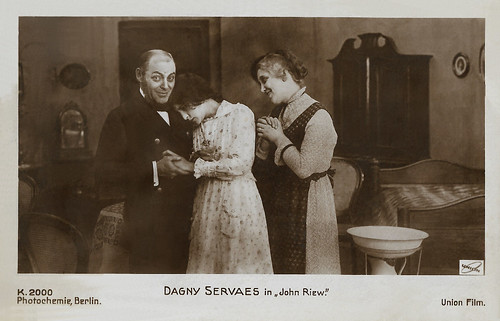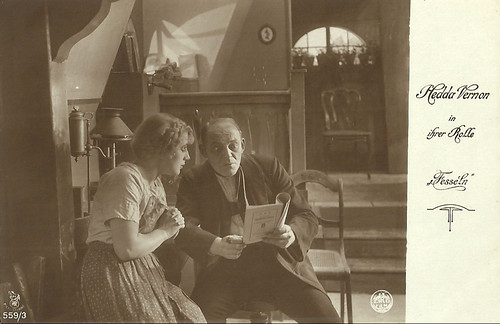Hermann Vallentin (1872-1945) was a German actor and singer. He joined the film business in 1914 as an established stage actor and became also very popular on the screen during the 1920s. The rise of the sound film offered this stage-proofed actor new challenges and he would have acted in numerous films but the rise of the Nazis finished his career.
Image may be NSFW.
Clik here to view.
German postcard by Verlag Hermann Leiser, Berlin.
Image may be NSFW.
Clik here to view.
German postcard by Photochemie, no. K. 2000. Photo: Union Film. Dagny Servaes as Anna Seyers in John Riew (Walter Schmidthässler, 1917). The man left of her is Hermann Vallentin, who plays Captain John Riew. The woman on the right is Käthe Dorsch, who plays Anna's mother.
Hermann Vallentin was born in 1872 in Berlin. He was the son of the wood merchant and factory owner Felix Vallentin. Hermann was the brother of the well-known actress and singer Rosa Valetti.
After playing music at the Königliches Schauspielhaus in Berlin with Max Grube and Hans Oberländer, he received his first engagement at the Central Theater in Berlin in the 1895/96 season. In the next few years, he performed at various Berlin theatres.
From 1914 Vallentin was also a busy film actor. He played the billionaire Lloyd opposite Friedrich Kayßler and Fritzi Massary in the popular film Der Tunnel/The Tunnel (William Wauer, 1915), made by Paul Davidson's PAGU production company. It was the first of several film adaptations of Bernhard Kellermann's 1913 novel 'Der Tunnel' about the construction of a vast tunnel under the Atlantic Ocean connecting Europe and America.
Vallentin was very versatile as an actor and could play any kind of character. He mostly embodied family patriots, patriarchs, and directors, but also small-scale philistines and - often - police commissioners. On stage, he often worked for the Deutsches Theater under the direction of Max Reinhardt and performed with his sister Rosa Valetti in such cabarets as the 'Kabarett Größenwahn' (1920) and 'Die Rampe' (1923).
Image may be NSFW.
Clik here to view.
German postcard in the Film-Sterne series by Rotophot, no. 559/1. Photo: Eiko-Film. Hedda Vernon and Hermann Vallentin in Fesseln (Hubert Moest, 1918).
Image may be NSFW.
Clik here to view.
German postcard in the Film-Sterne series by Rotophot, no. 559/3. Photo: Eiko-Film. Hedda Vernon and Hermann Vallentin in Fesseln (Hubert Moest, 1918).
Hermann Vallentin acted in five films by Ewald André Dupont and three by Friedrich Wilhelm. Murnau. For Dupont, he played e.g. the lead in Herztrumpf/Hearts Are Trumps (Ewald André Dupont, 1920) opposite Hans Mierendorff and Adele Sandrock, and the crime film Der Mord ohne Täter/Murder Without Cause (Ewald André Dupont, 1921).
For Murnau, he appeared in the silent chamber drama Schloß Vogelöd/The Haunted Castle (Friedrich Wilhelm. Murnau, 1921) and in the classic Der letzte Mann/The Last Laugh (Friedrich Wilhelm. Murnau, 1924), starring Emil Jannings.
Vallentin had a supporting part in the drama Madame wünscht keine Kinder/Madame Wants No Children (Alexander Korda, 1926) starring María Corda, Harry Liedtke and Maria Paudler. The film was made for the American Fox Film Corporation's German subsidiary.
He also could be seen in the British-made German-language drama Atlantik (Ewald André Dupont, 1929), a German-language version of the film Atlantic (1929) made at Elstree Studios by British International Pictures. The film was the first fully talking film to be released in Germany, where it was a major hit. It is based on the play 'The Berg' by Ernest Raymond which itself was based on the Titanic disaster.
Another early sound film was the satire Der Hauptmann von Köpenick/The Captain from Köpenick (Richard Oswald, 1931), based on the Hauptmann von Köpenick affair in 1906. A poor cobbler named Wilhelm Voigt purchased the second-hand uniform of a Prussian infantry captain. Wearing this, he travelled to the borough of Köpenick and ordered a troop of guardsmen to place themselves under his command. He then declared the town hall to be under military law, ordering the arrest of the mayor and treasurer and confiscating all the funds in the exchequer. Max Adalbert played Wilhelm Voigt, the title figure, and Vallentin played the uniform tailor Adolph Wormser.
The takeover of the Nazis ended Hermann Vallentin's film career abruptly - Vallentin was Jewish. In 1933 he emigrated and between 1934 and 1939 he worked on stage subsequently in Basel, Aussig, Prague, Vienna, again Basel, and Zürich.
In 1939 he emigrated to Palestine. Since he was not powerful in Hebrew, he had to cease all acting. He gave lectures, poems, and was temporarily spokesman of German-language news in the Palestine Broadcasting Service (P.B.S.).
Hermann Vallentin died in 1945 or 1948 (the sources differ) in Tel Aviv, Israel. He was 73 or 76. His niece Lotte Stein was also an actress.
Image may be NSFW.
Clik here to view.![Henny Porten, Ralph Arthur Roberts, Walter Jankuhn, and Hermann Vallentin in Lotte (1928)]()
German postcard by Ross Verlag, no. 97/3. Photo: Alex Schmoll, Berlin / HPF (Henny Porten-Froehlich Produktion). Henny Porten, Ralph Arthur Roberts, Walter Jankuhn, and Hermann Vallentin in Lotte (Carl Froehlich, 1928).
Image may be NSFW.
Clik here to view.![Hermann Vallentin]()
German postcard by Ross Verlag, no. 438/2. Photo: Becker & Maass, Berlin.
Sources: Stephanie D'heil (Steffi-Line - German), Wikipedia (English and German), and IMDb.
Image may be NSFW.
Clik here to view.

German postcard by Verlag Hermann Leiser, Berlin.
Image may be NSFW.
Clik here to view.

German postcard by Photochemie, no. K. 2000. Photo: Union Film. Dagny Servaes as Anna Seyers in John Riew (Walter Schmidthässler, 1917). The man left of her is Hermann Vallentin, who plays Captain John Riew. The woman on the right is Käthe Dorsch, who plays Anna's mother.
He could play any kind of character
Hermann Vallentin was born in 1872 in Berlin. He was the son of the wood merchant and factory owner Felix Vallentin. Hermann was the brother of the well-known actress and singer Rosa Valetti.
After playing music at the Königliches Schauspielhaus in Berlin with Max Grube and Hans Oberländer, he received his first engagement at the Central Theater in Berlin in the 1895/96 season. In the next few years, he performed at various Berlin theatres.
From 1914 Vallentin was also a busy film actor. He played the billionaire Lloyd opposite Friedrich Kayßler and Fritzi Massary in the popular film Der Tunnel/The Tunnel (William Wauer, 1915), made by Paul Davidson's PAGU production company. It was the first of several film adaptations of Bernhard Kellermann's 1913 novel 'Der Tunnel' about the construction of a vast tunnel under the Atlantic Ocean connecting Europe and America.
Vallentin was very versatile as an actor and could play any kind of character. He mostly embodied family patriots, patriarchs, and directors, but also small-scale philistines and - often - police commissioners. On stage, he often worked for the Deutsches Theater under the direction of Max Reinhardt and performed with his sister Rosa Valetti in such cabarets as the 'Kabarett Größenwahn' (1920) and 'Die Rampe' (1923).
Image may be NSFW.
Clik here to view.

German postcard in the Film-Sterne series by Rotophot, no. 559/1. Photo: Eiko-Film. Hedda Vernon and Hermann Vallentin in Fesseln (Hubert Moest, 1918).
Image may be NSFW.
Clik here to view.

German postcard in the Film-Sterne series by Rotophot, no. 559/3. Photo: Eiko-Film. Hedda Vernon and Hermann Vallentin in Fesseln (Hubert Moest, 1918).
Emigration to Palestine
Hermann Vallentin acted in five films by Ewald André Dupont and three by Friedrich Wilhelm. Murnau. For Dupont, he played e.g. the lead in Herztrumpf/Hearts Are Trumps (Ewald André Dupont, 1920) opposite Hans Mierendorff and Adele Sandrock, and the crime film Der Mord ohne Täter/Murder Without Cause (Ewald André Dupont, 1921).
For Murnau, he appeared in the silent chamber drama Schloß Vogelöd/The Haunted Castle (Friedrich Wilhelm. Murnau, 1921) and in the classic Der letzte Mann/The Last Laugh (Friedrich Wilhelm. Murnau, 1924), starring Emil Jannings.
Vallentin had a supporting part in the drama Madame wünscht keine Kinder/Madame Wants No Children (Alexander Korda, 1926) starring María Corda, Harry Liedtke and Maria Paudler. The film was made for the American Fox Film Corporation's German subsidiary.
He also could be seen in the British-made German-language drama Atlantik (Ewald André Dupont, 1929), a German-language version of the film Atlantic (1929) made at Elstree Studios by British International Pictures. The film was the first fully talking film to be released in Germany, where it was a major hit. It is based on the play 'The Berg' by Ernest Raymond which itself was based on the Titanic disaster.
Another early sound film was the satire Der Hauptmann von Köpenick/The Captain from Köpenick (Richard Oswald, 1931), based on the Hauptmann von Köpenick affair in 1906. A poor cobbler named Wilhelm Voigt purchased the second-hand uniform of a Prussian infantry captain. Wearing this, he travelled to the borough of Köpenick and ordered a troop of guardsmen to place themselves under his command. He then declared the town hall to be under military law, ordering the arrest of the mayor and treasurer and confiscating all the funds in the exchequer. Max Adalbert played Wilhelm Voigt, the title figure, and Vallentin played the uniform tailor Adolph Wormser.
The takeover of the Nazis ended Hermann Vallentin's film career abruptly - Vallentin was Jewish. In 1933 he emigrated and between 1934 and 1939 he worked on stage subsequently in Basel, Aussig, Prague, Vienna, again Basel, and Zürich.
In 1939 he emigrated to Palestine. Since he was not powerful in Hebrew, he had to cease all acting. He gave lectures, poems, and was temporarily spokesman of German-language news in the Palestine Broadcasting Service (P.B.S.).
Hermann Vallentin died in 1945 or 1948 (the sources differ) in Tel Aviv, Israel. He was 73 or 76. His niece Lotte Stein was also an actress.
Image may be NSFW.
Clik here to view.

German postcard by Ross Verlag, no. 97/3. Photo: Alex Schmoll, Berlin / HPF (Henny Porten-Froehlich Produktion). Henny Porten, Ralph Arthur Roberts, Walter Jankuhn, and Hermann Vallentin in Lotte (Carl Froehlich, 1928).
Image may be NSFW.
Clik here to view.

German postcard by Ross Verlag, no. 438/2. Photo: Becker & Maass, Berlin.
Sources: Stephanie D'heil (Steffi-Line - German), Wikipedia (English and German), and IMDb.